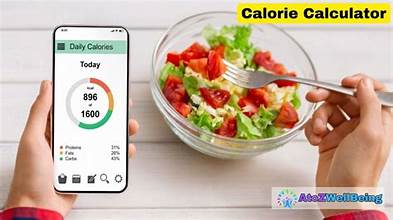What is Calorie calculator?
A calorie calculator is an online or digital tool that helps you estimate how many calories your body requires each day whether your goal is to maintain, lose, or gain weight. By entering key details such as age, gender, weight, height, and activity level, the calculator applies trusted scientific formulas, including the Mifflin-St Jeor and Harris-Benedict equations, to determine your daily caloric needs. These formulas are widely recognized in nutrition and fitness for their accuracy.
Some calculators provide only the total daily calorie requirement, while advanced versions go further by suggesting the ideal distribution of macronutrients carbohydrates, proteins, and fats to give you a more precise picture of your nutritional needs.
Think of it as a nutrition roadmap. Just like GPS navigation helps you reach a destination, a calorie calculator guides you toward your health and fitness goals by showing how much energy (calories) your body needs to perform at its best. Without this guidance, many people end up guessing often undereating, which drains energy, or overeating, which may cause unwanted weight gain.
By setting a personalized benchmark, a calorie calculator empowers you to build healthy eating habits tailored to your unique body, lifestyle, and goals. Whether you’re an athlete aiming for performance, someone trying to lose weight safely, or simply looking to maintain a balanced lifestyle, this tool can help you stay on track.
Why Calorie Tracking Is Essential for a Healthy Modern Lifestyle?
In today’s fast-paced world, convenience foods, oversized servings, and constant snacking make it easy to consume far more calories than our bodies actually need. At the same time, modern life often keeps us seated whether at desk jobs, in traffic, or in front of digital screens leading to a significant drop in daily energy expenditure. This imbalance between calories consumed and calories burned has become one of the major drivers of obesity, metabolic issues, and lifestyle-related diseases across the globe.
Calorie tracking acts as a powerful solution. By monitoring your intake, you gain a clearer understanding of your body’s energy needs and how your food choices impact your health. For instance, what seems like a harmless flavored latte might contain over 300 calories equivalent to a light meal. Without awareness, these hidden calories quickly add up, often becoming the reason behind gradual weight gain.
When you use a calorie calculator or tracking tool, you uncover these details, making it easier to adjust portion sizes, choose nutrient-dense alternatives, and cut down on unnecessary high-calorie snacks. Over time, this builds healthier eating patterns and supports weight management, improved energy levels, and overall well-being.
Calories and Nutrition: How Energy Fuels Your Body?
What are calories and why do they matter?
Calories are units of energy that your body depends on to perform every essential function whether it’s breathing, thinking, moving, digesting food, or repairing cells while you sleep. Every bite of food you eat is converted into usable energy through metabolic processes. If your calorie intake matches your energy expenditure, your weight stays stable. Consuming more than you burn leads to fat storage, while eating less forces your body to tap into stored energy reserves.
But calories are about more than just weight control they directly influence your performance, health, and overall well-being. Consistently eating too few calories can leave you drained, irritable, and lacking vital nutrients. On the other hand, consuming too many may contribute to obesity, diabetes, and cardiovascular disease. By understanding the right balance, you can view calories as a tool for fueling your body, not as an enemy.
Think of it like driving a car. Too little fuel, and the engine stalls. The wrong type of fuel lowers performance. Too much, and it leads to waste. Similarly, a calorie calculator helps ensure you’re fueling your “engine” your body with the right amount of energy to function at its best.
Macronutrients and Their Caloric Values:
Not all calories are the same. The food you eat provides energy through three main macronutrients, each playing a unique role:
- Carbohydrates (4 calories per gram): The body’s preferred energy source, crucial for powering the brain, muscles, and nervous system.
- Proteins (4 calories per gram): The building blocks for tissues and muscles, essential for repair, recovery, and overall growth.
- Fats (9 calories per gram): Often misunderstood, but vital for hormone regulation, nutrient absorption, and long-term energy storage.
Balancing these macronutrients is just as important as monitoring overall calorie intake. For instance, two 2,000-calorie diets can have completely different effects depending on whether those calories come from sugary snacks or lean proteins and healthy fats.
That’s why using a calorie and macronutrient calculator is so valuable. It not only estimates your daily energy requirements but also guides you toward the right nutrient balance helping you improve weight management, boost energy, and enhance overall health.
Importantly, calorie tracking isn’t about rigid dieting or obsessing over every bite. Instead, it’s about mindfulness and balance similar to how financial budgeting helps you save and spend wisely. Just as you wouldn’t spend blindly without knowing your bank balance, monitoring calories ensures your body is fueled properly without going into excess.
In short, calorie tracking has evolved beyond being a tool for athletes or people on strict diets. It’s now a practical lifestyle strategy for anyone who wants to stay healthy, avoid chronic diseases, and take control of their nutrition in today’s convenience-driven environment.
Empty Calories vs. Healthy Calories:
The key difference between good calories and empty calories lies in nutrient density. Good calories come from wholesome, nutrient-rich foods such as fruits, vegetables, whole grains, lean proteins, legumes, nuts, and seeds. These foods not only provide energy but also supply essential vitamins, minerals, fiber, and antioxidants that support long-term health and well-being.
On the other hand, empty calories are found in foods and drinks high in added sugars, refined carbs, and unhealthy fats such as sodas, candies, pastries, fried items, and fast food. While they deliver a quick burst of energy, they lack significant nutritional value and often contribute to overeating.
Relying heavily on empty-calorie foods can leave you feeling tired, unsatisfied, and more likely to develop chronic health conditions like obesity, diabetes, and heart disease. In contrast, choosing nutrient-dense options ensures that every calorie works harder for your body fueling you with energy while also promoting better health.
Modern calorie calculators combined with food databases can make this distinction clearer by showing not just the number of calories in a meal but also its overall nutritional profile. This helps you focus on quality, not just quantity, when it comes to managing your diet.
Key Advantages of Using a Calorie Calculator for Health and Fitness:
1. Effective Weight Management:
One of the greatest strengths of a calorie calculator is its ability to guide weight management. Whether your goal is to lose fat, maintain your current weight, or gain muscle, knowing your daily caloric needs gives you a clear foundation. Without this knowledge, most people end up guessing and guessing often leads to slow progress or frustration.
For fat loss, a calculator helps you create a controlled calorie deficit, allowing you to slim down steadily without extreme restrictions. For muscle gain, it ensures you consume enough surplus calories to support growth while minimizing fat accumulation. Even for weight maintenance, it helps prevent the gradual “creep” of extra pounds that can occur from small daily overages.
Rather than relying on fad diets or quick fixes, a calorie calculator gives you a sustainable strategy similar to managing a financial budget. Just as you wouldn’t spend money without knowing your income, you shouldn’t eat without knowing your calorie needs.
2. Supports fitness Performance and Muscle Growth:
A calorie calculator isn’t just for weight loss it’s equally valuable for athletes and fitness enthusiasts. When you train hard, your body requires the right balance of calories and macronutrients to recover and build muscle. Without sufficient fuel, workouts become less effective, and results may stall.
By setting personalized targets, a calorie calculator helps optimize muscle-building by creating a small, controlled calorie surplus usually 250–500 calories above maintenance. This allows most of the extra energy to go toward lean muscle instead of fat. It also helps athletes fine-tune their nutrition timing, such as adjusting carb intake for workout fuel and ensuring adequate protein for muscle repair. In short, it removes the guesswork and aligns your diet with your training.
3.Promotes Mindful Eating Habits:
Tracking calories encourages mindfulness by making you more aware of portion sizes, ingredients, and hidden sources of calories. Many people are surprised when they realize how calorie-dense some foods like sugary drinks or processed snacks can be. This awareness helps shift eating patterns over time.
Instead of snacking out of boredom or convenience, you start asking: Am I actually hungry, or just craving? Over time, these conscious decisions reshape habits, making eating intentional rather than automatic. Importantly, mindful eating doesn’t mean restriction it’s about balance. By tracking, you can still enjoy treats without guilt, because they’re accounted for within your goals.:
4.Prevents Under-Eating and Over-Eating:
While overeating is a common challenge, under-eating can also be a problem, especially for those who cut calories too drastically. Severe restriction may lead to fatigue, muscle loss, and even a slowed metabolism. On the other hand, overeating even on “healthy foods” can stall progress if your intake consistently exceeds your needs.
A calorie calculator provides a balanced range, ensuring you eat enough to fuel your body without going overboard. For example, someone aiming to lose weight might be advised to consume 1,800 calories daily, while another working on muscle growth may need 2,600. These tailored guidelines act as a safeguard, keeping your nutrition aligned with your goals and preventing extreme mistakes.
Different Types of Calorie Calculators and How They Work?
Basic Online Calorie Calculators:
The simplest form of calorie-tracking tools are free online calculators. These tools typically ask for basic details such as age, weight, height, gender, and activity level to estimate your daily calorie needs. While they don’t provide highly personalized guidance, they give a quick overview of how many calories you should be consuming to maintain, lose, or gain weight.
The main limitation is that they don’t usually account for specific goals like building muscle, managing health conditions, or following specialized diets. Still, they’re an excellent starting point, especially for beginners who want a straightforward introduction to calorie tracking. Think of them as the “training wheels” of nutrition planning.
Mobile Apps with Enhanced Tracking Features:
Calorie-tracking apps such as My Fitness Pal, Lose It, and Cronometer provide a much more detailed approach. Beyond calculating daily calorie needs, these apps allow users to log meals, scan food barcodes, and connect with fitness trackers. Many come with large food databases, which means you don’t have to manually enter nutritional data for every item you consume.
What makes these apps powerful is their ability to deliver in-depth insights. They don’t just show total calorie intake they also break down macronutrients (carbs, proteins, fats), track micronutrient levels, and chart progress over time. Some even let you customize targets, such as increasing protein for muscle gain or lowering carbs for a ketogenic diet.
For those who take fitness and health seriously, these apps act like a personal nutrition assistant, combining accuracy with convenience.
Smart Device and Wearable with Calorie Tracking:
Modern technology has brought calorie tracking into real-time with wearable devices like Fitbit, Apple Watch, and Garmin trackers. These gadgets monitor calorie expenditure based on activity and can be synced with apps that track food intake. Together, they give a dynamic picture of your energy balance.
The advantage here is adaptability. If you burn more calories on an active day such as during a long hike or intense workout the device adjusts your recommended intake to prevent under-fueling. On less active days, it recalculates and lowers your target.
When paired with calorie calculators, wearables provide a comprehensive, data-driven view of your health. Instead of estimating, you gain precise, real-time feedback to fine-tune your nutrition and lifestyle choices.
How to Use a Calorie Calculator the Right Way?
Set Realistic Goals:
A common mistake when using a calorie calculator is aiming for results that are too extreme like trying to lose 20 pounds in a single month. Such targets are unsafe and unsustainable. Instead, a calorie calculator helps you establish realistic, science-based goals tailored to your body and lifestyle. For weight loss, a safe pace is about 1–2 pounds per week, while muscle gain usually ranges from 0.5–1 pound per week.
Start by defining your primary objective fat loss, weight maintenance, or muscle gain. After determining your daily calorie needs, adjust by adding or subtracting 250–500 calories per day based on your goal. This gradual shift prevents metabolic shock, reduces extreme hunger, and supports long-term success.
It’s equally important to focus on non-scale victories. Instead of obsessing over weight alone, track changes in energy levels, strength, endurance, mood, and overall well-being. When combined with a balanced lifestyle, a calorie calculator becomes more than just a number tool it becomes a guide for healthier living.
Tracking Daily Food Intake with a Calorie Calculator:
The second key to getting real results from a calorie calculator is consistency in tracking your meals. Many people begin with enthusiasm but stop after a week because they find the process tedious. The reality is that consistency not perfection is what drives progress. Even if your logging isn’t flawless, keeping track creates awareness and highlights patterns you might otherwise miss.
For example, you may realize that your “healthy” smoothie actually contains 600 calories from hidden sugars, or that late-night snacks are silently adding 400 extra calories to your day. Once you see these trends, making adjustments becomes much easier.
Fortunately, modern tracking apps simplify the process with barcode scanning, saved meal templates, and smart portion suggestions. For the most accurate results, using a kitchen scale to measure food is recommended. While it may feel like extra effort at first, it quickly becomes a habit and the payoff is better accuracy, smarter choices, and faster progress toward your health goals.
Conclusion:
A calorie calculator is more than just a number-crunching tool it’s a practical guide for building healthier habits, managing weight, and fueling your body correctly. By setting realistic goals, tracking daily intake, and understanding the balance of nutrients, you gain control over your diet and lifestyle. Whether through simple online calculators, advanced apps, or smart wearables, calorie tracking empowers you to make informed choices, avoid hidden pitfalls, and stay consistent. In today’s fast-paced world, it’s not about strict dieting but about mindful eating and balance ensuring your body gets the right energy to perform, recover, and thrive.








